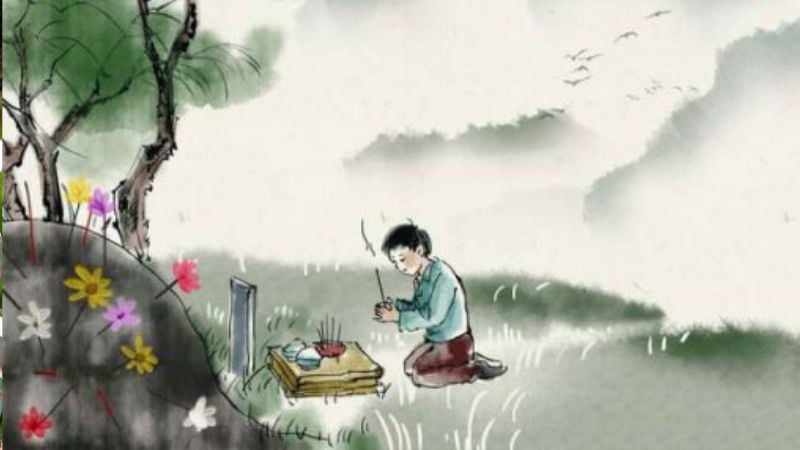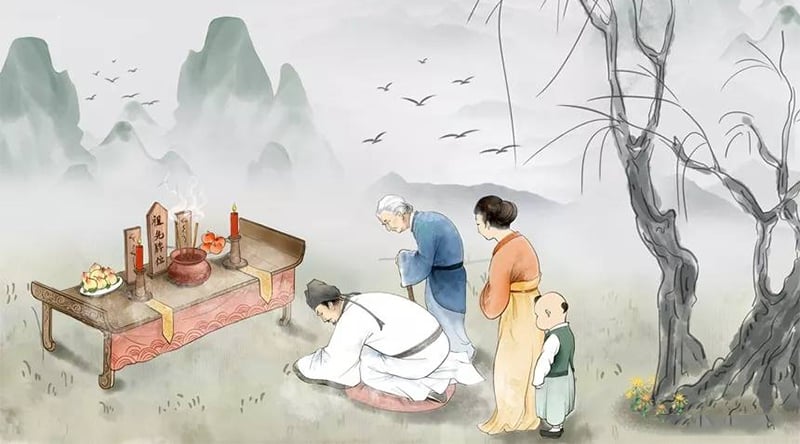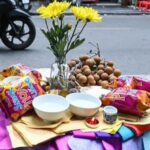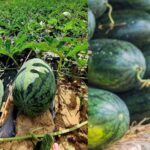Society’s customs and traditions are evolving to embrace a more open-minded approach, moving away from the stringent demands of the past. Ancestral wisdom advises: “Three people should not tend to the ancestral graves, for the family to prosper.”
The Three Individuals Who Should Refrain from Ancestral Grave Visits
+ Son-in-Law
Paying respects to ancestors is an integral part of Vietnamese culture, a tradition spanning millennia. It serves as a means of mourning and honoring predecessors while seeking their blessings for prosperity. While the absence of male offspring is considered one of the three greatest disrespectful acts, the presence of a son-in-law during ceremonies is frowned upon. Despite being a part of the family, he is still considered an ‘outsider’ in the traditional sense.

+ Elderly Individuals
Grave-tending rituals carry a solemn atmosphere, which can be emotionally taxing, especially for the elderly. The physical demands of navigating uneven terrain and the potential for negative health impacts on older individuals are concerns. Additionally, the somber nature of such events may trigger thoughts of mortality, leading to a potential emotional burden.
Furthermore, there is a belief that those “below seventy” may be reminded of their own mortality and funeral rites. In the unfortunate event of an accident during the visit, it could leave a lasting impression of regret for future generations.
+ Children Under the Age of Three
Ancestral grave visits are solemn occasions, devoid of laughter and playful noises. Children under three years old may not comprehend the purpose of such visits, and bringing them along could be seen as disrespectful to the ancestors. Additionally, the cold and damp conditions at gravesites in the early morning could pose health risks for young children with developing immune systems, potentially leading to fevers or unexplained mental disorders. This is often referred to as “scaring the soul.” As safety is a priority, it is best to leave young children at home.
Important Considerations for Ancestral Grave Visits

Some key points to keep in mind during these visits include:
+ End-of-year grave-tending rituals are typically performed in the morning.
+ Participants should refrain from joking or teasing others and dress respectfully to show reverence for their ancestors.
+ Before commencing the cleaning, the head of the family or an elder should light incense and a lamp to seek permission and recite prayers.
+ While waiting for the incense to burn, family members can proceed with the cleaning. Once about two-thirds of the incense sticks have burned, the head of the family will offer paper money and receive blessings.
+ When offering paper money, one should call out the names of the deceased to ensure they receive the offerings.
+ Upon returning home after the ritual, all participants should bathe and change into clean clothes.
The Oldest Market in Hue: A 170-Year-Old Legacy That Endured Through Time
The Gia Lac market exudes a unique charm, harking back to the nostalgic scenes of a bygone Tet holiday brimming with warmth and rich cultural heritage. It is not merely a traditional marketplace but a cultural hub, seamlessly connecting the past with the present, the sellers with the buyers, and, most importantly, preserving the quintessential spiritual values of Hue.
The Ultimate Guide to Buying Betel and Areca Nuts for Ancestor Worship: Uncover the Secret to Attracting Wealth and Prosperity
Chewing betel and areca nuts is an integral part of Vietnamese culture, often used as an offering during worship. However, not everyone knows the correct way to prepare and present these offerings. We are here to guide you through the process, ensuring your offerings are not only culturally significant but also perfectly prepared.





































